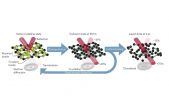(Press-News.org) Bari, Italy, July 28, 2015 -- A new study by researchers at the University of Bari Aldo Moro, Bari, Italy, Geriatric Unit & Laboratory of Gerontology and Geriatrics, IRCCS "Casa Sollievo della Sofferenza", San Giovanni Rotondo, Foggia, Italy, and Istituto Superiore di Sanità (ISS), Roma, Italy, estimates the association between change or constant habits in coffee consumption and the incidence of mild cognitive impairment (MCI), evaluating 1,445 individuals recruited from 5,632 subjects, aged 65-84 year old, from the Italian Longitudinal Study on Aging (ILSA), a population-based sample from eight Italian municipalities with a 3.5-year median follow-up. These findings are published in the Journal of Alzheimer's Disease.
Mild cognitive impairment (MCI) is considered a prodromal stage of Alzheimer's disease (AD) and dementia. As no effective treatment exists to modify the natural history of this neurodegenerative disorder, the identification and subsequent management of risk/protective factors may be crucial for prevention of MCI and its progression to AD and dementia. Among diet-associated factors, coffee is regularly consumed by millions of people around the world and owing to its caffeine content, it is the best known psychoactive stimulant resulting in heightened alertness and arousal and improvement of cognitive performance.
Besides short-term effects of caffeine-containing beverages, some case-control and cross-sectional and longitudinal population-based studies evaluated the long-term effects on brain function and provided evidence that coffee, tea, or caffeine consumption or higher plasma caffeine levels may be protective against cognitive impairment and dementia, with some notable exceptions.
An interesting finding in this study was that cognitively normal older individuals who modified their habits by increasing with time their amount of coffee consumption (> 1 cup of coffee/day) had about two times higher rate of MCI compared to those with reduced habits (< 1 cup of coffee/day) and about one and half time higher rate of MCI in comparison with those with constant habits (neither more nor less 1 coffee/day). Moreover, those who habitually consumed moderate amount of coffee (1 or 2 cups of coffee/day) had a reduced rate of the incidence of MCI than those who habitually never or rarely consumed coffee. No significant association was verified between who habitually consumed higher levels of coffee consumption (> 2 cups of coffee/day) and the incidence of MCI in comparison with those who never or rarely consumed coffee.
"These findings from the Italian Longitudinal Study on Aging suggested that cognitively normal older individuals who never or rarely consumed coffee and those who increased their coffee consumption habits had a higher risk of developing MCI. Therefore, moderate and regular coffee consumption may have neuroprotective effects also against MCI confirming previous studies on the long-term protective effects of coffee, tea, or caffeine consumption and plasma levels of caffeine against cognitive decline and dementia," said investigators Vincenzo Solfrizzi, MD, PhD, and Francesco Panza, MD, PhD, University of Bari Aldo Moro, Bari, Italy.
The authors hypothesized different potential mechanisms in explaining the neuroprotective effects of coffee consumption observed in this study. The long-term neuroprotective effect of caffeine may involve competitive antagonism of excessive activation of adenosine A2A receptors (A2ARs), which may attenuate damage caused by ?-amyloid (A?), the toxic peptide accumulating in AD brains. Indeed, both acute or long-term caffeine administration were shown to reduce brain A? levels in AD transgenic mice and memory restoration and reversal of AD pathology in mice with pre-existing A? burden. Adenosine is a neuromodulator that operates via the most abundant inhibitory adenosine A1 receptors (A1Rs) and the less abundant, but widespread, facilitatory A2ARs. A1Rs play a key role in neuroprotection, decreasing glutamate release and hyperpolarizing neurons, and their activation attenuates brain damage, whereas their blockade exacerbates damage in adult animals.
In contrast, A2ARs blockade confers robust brain neuroprotection in adult animals. Moreover, while central A1Rs are down-regulated by chronic noxious situations, the brain neuroprotective effect of A2AR antagonists is maintained in chronic noxious brain conditions without observable peripheral effects, thus justifying the interest of A2AR antagonists as novel protective agents in neurodegenerative diseases such as AD. Therefore, the ability of caffeine to prevent memory deterioration in animal models of aging or AD may be related to the action of A2ARs rather than A1Rs, suggesting that an adequate adenosinergic tonus is required for normal memory performance and that over- or down-activation of the adenosine system may result in impaired memory functioning.
This hypothesis could in part explain why, as shown in this study, both no or rare and higher consumption of coffee (> 2 cups/day) were associated with higher risk of the incidence of MCI. Accordingly, moderate doses of caffeine improve memory performance in rodents, whereas higher doses of caffeine may impair memory acquisition. Biological effects of caffeine on brain function also included modulation of white matter lesions and/or microvascular ischemic lesions, and improved insulin sensitivity, so reducing the risk of type 2 diabetes, which is a strong risk factor for cognitive decline. Moreover, caffeine could in part compensate the cognitive decline in older individuals because its effects on vigilance and attention, mainly in situations of reduced alertness. Finally, habitual and moderate consumption of coffee may prevent MCI through attenuation of subclinical neuroinflammation, and reduction in oxidative stress.
The authors concluded: "More sensitive outcomes such as findings from neuroimaging studies should become available from experimental data, so further explaining the mechanisms underlying the neuroprotective effects of coffee, tea, and caffeine consumption. Larger studies with longer follow-up periods should be encouraged, addressing other potential bias and confounding sources, so hopefully opening new ways for diet-related prevention of dementia and AD."
INFORMATION:
Rewritable CDs, DVDs and Blu-Ray discs owe their existence to phase-change materials, those materials that change their internal order when heated and whose structures can be switched back and forth between their crystalline and amorphous phases. Phase-change materials have even more exciting applications on the horizon, but our limited ability to precisely control their phase changes is a hurdle to the development of new technology.
One of the most popular and useful phase-change materials is GST, which consists of germanium, antimony, and tellurium. This material is ...
Hercules, CA -- July 28, 2015 -- Droplet Digital PCR (ddPCR™) has been shown to be a useful tool for the identification of microRNAs (miRNA) circulating in the blood that could serve as potential cancer biomarkers. A study in the journal Oncotarget further supports these findings and identifies a novel miRNA that shows great potential for breast cancer diagnosis. These findings confirm the potential clinical utility of ddPCR technology to precisely and reliably quantify cell-free miRNAs. The study also emphasizes that sample type as well as its preparation are critical ...
ANN ARBOR--Secondary students found healthier foods on more lunch menus in 2013 than in 2011, resulting in fewer nutrition disparities for small schools or those with racially diverse student bodies.
The findings by University of Michigan researchers show significant improvements made in the National School Lunch Program at public middle and high schools in 2013 after many years of meal disparities based on school size or demographics.
"While these improvements are encouraging, continued progress is needed," said Yvonne Terry-McElrath, a researcher at the U-M Institute ...
Wild chimpanzees in the forests of Uganda are increasingly eating clay to supplement the minerals in their diet, according to a long-term international study published in the early version of the journal PLOS ONE. The paper led by the University of Oxford describes how the researchers observed wild chimpanzees in the Budongo forest eating and drinking from clay pits and termite mounds. The paper concludes that this change in diet may be partly due to the widespread destruction of raffia palm trees that chimps relied on for their minerals in the past. However, the main reason ...
(SACRAMENTO, Calif.) -- UC Davis health economists have for the first time projected the total costs of caring for all people with autism spectrum disorder (ASD) in the U.S. for the current calendar year and in 10 years if effective interventions and preventive treatments for the condition are not identified and widely available.
Their forecasts for ASD-related medical, nonmedical and productivity losses are $268 billion for 2015 and $461 billion for 2025. The researchers noted that these estimates are conservative and, if ASD prevalence continues to increase as it has ...
The continuous quality improvement (CQI) approach was introduced on a pilot basis to 30 sites across Uganda. This approach identified barriers in achieving national standards for voluntary medical male circumcision (VMMC), identified possible solutions to overcome these barriers, and carried out improvement plans to test these changes while collecting performance data to objectively measure whether they had bridged gaps.
Teams used a 53-indicator quality assessment tool adapted by the Ministry of Health and based on the WHO VMMC Quality Toolkit as a management tool to ...
Surgeons at The Children's Hospital of Philadelphia (CHOP) joined with colleagues from Penn Medicine recently to complete the world's first bilateral hand transplant on a child. Earlier this month, the surgical team successfully transplanted donor hands and forearms onto eight-year-old Zion Harvey who, several years earlier, had undergone amputation of his hands and feet and a kidney transplant following a serious infection.
Led by L. Scott Levin, M.D., FACS*, Chairman of the Department of Orthopaedic Surgery at Penn Medicine, Director of the Hand Transplantation Program ...
Whether online auctions are selling rare Pokemon cards or fine art, the science behind inciting the highest bids gets a boost from a paper to be published in the September issue of the Journal of Retailing. Researchers from Germany and Australia teamed up to explore how bidders' emotions are affected by different types of auctions and how those emotions affect their bidding.
In "Auction Fever! How Time Pressure and Social Competition Affect Bidders' Arousal and Bids in Retail Auctions," the three authors - Marc T.P. Adam of the University of Newcastle, Professor ...
PHILADELPHIA - Whether you're a human, a mouse, or even a fruitfly, losing sleep is a bad thing, leading to physiological effects and behavioral changes. One example that has been studied for many years is a link between sleep loss and aggression. But it can be difficult to distinguish sleep loss effects from stress responses, especially in rodent or human models.
A team of researchers from the Perelman School of Medicine at the University of Pennsylvania used fruitflies to probe deeper into the cellular and molecular mechanisms that govern aggression and sleep. They ...
Pharmaceutical firms "underinvest" in long-term research to develop new cancer-fighting drugs due to the greater time and cost required to conduct such research, according to a newly published study co-authored by MIT economists.
Specifically, drugs to treat late-stage cancers are less costly to develop than drugs for earlier-stage cancers, partly because the late-stage drugs extend people's lives for shorter durations of time. This means that the clinical trials for such drugs get wrapped up more quickly, too -- and provide drug manufacturers more time to control patented ...

